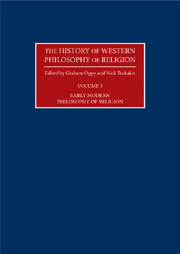Book contents
- Frontmatter
- Contents
- Editorial Introduction
- Contributors
- 1 Early Modern Philosophy of Religion: An Introduction
- 2 Niccolò Machiavelli
- 3 Martin Luther
- 4 John Calvin
- 5 Michel de Montaigne
- 6 Francisco Suárez
- 7 Thomas Hobbes
- 8 René Descartes
- 9 Ralph Cudworth
- 10 Blaise Pascal
- 11 Baruch Spinoza
- 12 John Locke
- 13 Gottfried Wilhelm Leibniz
- 14 George Berkeley
- 15 Voltaire
- 16 The Deists
- 17 Jonathan Edwards
- 18 Thomas Reid
- 19 David Hume
- 20 Denis Diderot
- 21 Immanuel Kant
- 22 Gotthold Ephraim Lessing
- 23 William Paley
- Chronology
- Bibliography
- Index
9 - Ralph Cudworth
- Frontmatter
- Contents
- Editorial Introduction
- Contributors
- 1 Early Modern Philosophy of Religion: An Introduction
- 2 Niccolò Machiavelli
- 3 Martin Luther
- 4 John Calvin
- 5 Michel de Montaigne
- 6 Francisco Suárez
- 7 Thomas Hobbes
- 8 René Descartes
- 9 Ralph Cudworth
- 10 Blaise Pascal
- 11 Baruch Spinoza
- 12 John Locke
- 13 Gottfried Wilhelm Leibniz
- 14 George Berkeley
- 15 Voltaire
- 16 The Deists
- 17 Jonathan Edwards
- 18 Thomas Reid
- 19 David Hume
- 20 Denis Diderot
- 21 Immanuel Kant
- 22 Gotthold Ephraim Lessing
- 23 William Paley
- Chronology
- Bibliography
- Index
Summary
Ralph Cudworth (1617–88) is one of the great overlooked figures in early modern philosophy. Despite the outpouring of contextual studies of early modern thought in recent years, Cudworth's work has been largely ignored. At first glance it is easy to see why. His overt Neoplatonism appears to place him at odds with the general trends of early modern thought and against the emerging empiricism of English seventeenth-century thought in particular. Also his style, owing, as it does, so much to the humanist scholarship of the Renaissance, seems more eager to look backwards than forwards. At best Cudworth is characterized as a middling figure, standing Janus-faced on the margins between antiquity and modernity. These traditional characterizations of Cudworth, however, fundamentally misinterpret Cudworth's thought. Despite the immediate problems presented by his thought, and his voluminous The True Intellectual System of the Universe (hereafter Intellectual System; 1678) in particular, Cudworth deserves a higher place within the history of philosophy. He, along with the other Cambridge Platonists, was one of the first English thinkers to engage systematically with Cartesian thought. Cudworth also provided some of the earliest criticisms of the thought of Thomas Hobbes and Baruch Spinoza. However, Cudworth should not simply be read as a commentator of contemporary thought. His thought, particularly in the philosophy of religion, provided innovative and progressive accounts of central terms in Christian theology, in particular the doctrine of the Trinity.
- Type
- Chapter
- Information
- The History of Western Philosophy of Religion , pp. 113 - 126Publisher: Acumen PublishingPrint publication year: 2009

